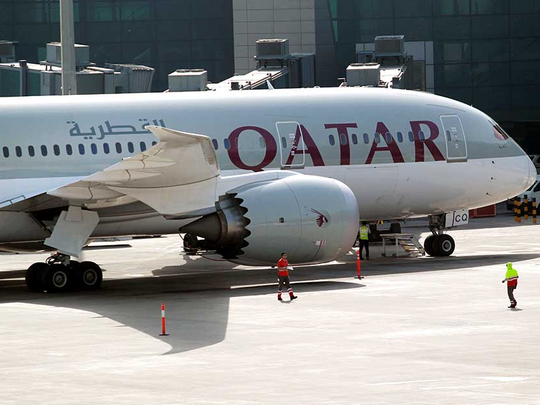
Dubai
The UAE’s decision to close its airspace to aircraft flying to and from Qatar is causing a surge in bookings on other carriers as passengers alter their plans to avoid flying on Qatar Airways or transit in Doha.
Travel agents said they were flooded with requests from customers to tweak their travel plans after UAE carriers including Etihad Airways, Emirates, flydubai, and Air Arabia suspended flights to Qatar starting June 6.
On Thursday, the UAE’s General Civil Aviation Authority (GCAA) also said it is closing UAE airspace to any aircraft flying to and from Qatar amid a growing rift between the two GCC countries.
The move would ban all international flights serving Doha from flying through the UAE’s airspace, and expands on the UAE’s government ban on all Qatari means of transportation from coming to or leaving the country. It comes just three days after the UAE, Saudi Arabia, Bahrain, and Egypt announced they are severing ties with Qatar amid accusations that Doha sponsors terrorism.
“We’re going mad. Eid holidays are coming up, so people already have bookings for July and August. Many people have already started cancelling, and we’re looking for alternatives. We’re moving customers who had bookings to the US, for example, on Qatar Airways to Etihad,” said Biju Nair, marketing manager at Lulu International Travel and Tourism.
Nair added, “For customers with long-haul flights, our only options are Etihad and Emirates, but for short haul, we’re also using Jet Airways, Air Arabia, and flydubai.”
Similarly, Daniel Ponzo, general manager at Al Rostamani Travel and Holidays, said customers were either cancelling trips or postponing them or asking travel agents to be rebooked on other carriers.
“Customers can’t fly on Qatar Airways from the UAE, so there’s no other option but flying on other airlines, but that doesn’t mean they’ll just fly on Emirates or Etihad. If someone is flying to Frankfurt or London, they can use British Airways or Lufthansa, but the major impact was on clients who wanted to fly to Doha and come back, and that had to be cancelled,” he said.
Asked whether prices on other carriers have surged as a result of a sudden increase in demand, Ponzo said prices were more or less stable, though that might change on the medium or longer terms if the suspensions continue.
The latest ban on Thursday comes just a day after the Civil Aviation Authority said it is shutting all offices of Qatar Airways in the country with immediate effect. Saudi Arabia and Bahrain, too, revoked licenses of Qatar Airways.
Operating costs
The ban on using UAE airspace is also expected to increase operating costs for airlines, which will be forced to find alternative routes to their destinations.
“If large areas of nearby territories become ‘no fly’ zones, then operating costs will rise significantly as flight times increase. This has implications for aircraft scheduling as well. With the addition of other territories [as no fly zones], the problem increases further,” said Peter Morris, chief economist at Ascend, a UK-based consultancy.
He pointed that such regional tensions between the GCC countries are likely to cause a hike in oil prices, too, which would then increase costs further for all carriers.
On Monday, following news that four Arab countries were severing ties with Qatar, oil prices climbed, reaching around $50.74 a barrel, though the rise proved to be short-lived.
— With inputs from Bloomberg












